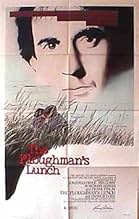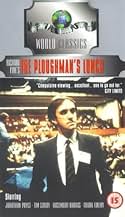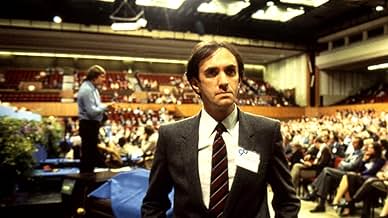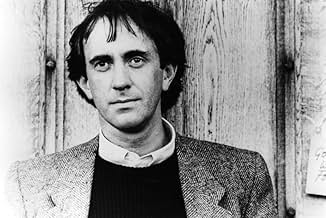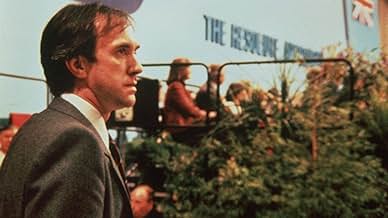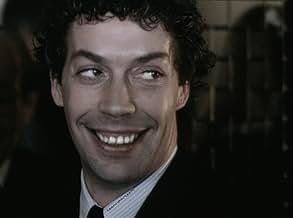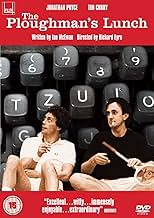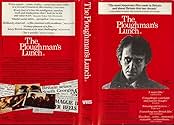Adicionar um enredo no seu idiomaJames Penfield (Jonathan Pryce) has made a career out of journalism. Now bankrupt, he finds himself with a group of other writers in the middle of the dispute-ridden British homeland at the ... Ler tudoJames Penfield (Jonathan Pryce) has made a career out of journalism. Now bankrupt, he finds himself with a group of other writers in the middle of the dispute-ridden British homeland at the time of the Falklands War.James Penfield (Jonathan Pryce) has made a career out of journalism. Now bankrupt, he finds himself with a group of other writers in the middle of the dispute-ridden British homeland at the time of the Falklands War.
- Indicado para 1 prêmio BAFTA
- 1 vitória e 1 indicação no total
Robert Cartland
- Editor
- (as Bob Cartland)
Avaliações em destaque
With rumblings coming from the wires about some Argentine activity on the remote island of South Georgia and Margaret Thatcher's first administration struggling to deal with the gloomy British economic outlook, jaded radio journalist "Penfield" (Jonathan Pryce) finds himself trying to stay motivated despite the fact that he hasn't a penny to his name. In search of at least a degree of self-fulfilment, he decides to write a book all about the Franco-British invasion on the Suez Canal in 1956. He has an interest in the geo-political dynamics and history of those turbulent events, and so sets about lining up some interviewees to put some flesh on the bones and it's whilst he is researching, he encounters the redoubtable "Ann" (Rosemary Harris) whose left wing political agenda chimes a little with his but more revealingly shows him up as a bit of an intellectual lightweight. Indeed, his lack of societal "evolution" is all too clearly demonstrated as he visits his poorly mother and his father, both traditional working class and proud parents, with whom he has but a tangential connection nowadays. To be honest, I found this all to be a little too pedestrian and introspective a tale of a man who probably started out as an idealist but who was complicit in letting the system grind him down into a supercilious cynic. Pryce delivers well enough but with so little by way of characterisation to work with it all rather drearily meanders along. Harris, on the other hand, has less to do but makes much more of her role as a women still tainted by life, but much more in control of what she thinks and what she wants. Of course there is some political commentary here, and a thinly veiled critique of all things Conservative and capitalist - either contemporary or during Suez when Eden was at the British helm, but that's also rather undercooked and disappointingly predictable. All in all it comes across as a television movie in terms of the production, the score and the photography and though watchable enough as a comment on Britain at the time, isn't really very memorable.
Always intelligent, but hardly cinematic, this is certainly an interesting film, but not fully entertaining.
I saw it on release and again for the second time this week and the lasting impression is a dog's dinner of ideas. At the centre there is a doomed romance, overlaid with a smorgasbord of messages inter-weaved in the script.
I shall attempt to list these message here.
a) The long term decline of Britain's importance in the world, b) the folly of the Suez expedition and a sort of oblique parallel with the Falklands War which doesn't work - Suez was a disaster, the Falklands campaign successful, c) the emotional toughness/nastiness of the Thatcher government, d) the Greenham Common anti-nuclear encampment (not sure what this is doing in the film), e) the lies sold by advertising, f) the bias inherent in the way we rewrite history, g) the English class system, h) the emotional coldness of journalists. Phew!
Added on to this, we have the conundrum of our hard to like hero James Penfield who wants love, but does not show it to those who love him. Crucially, he is foolishly chasing a snooty, upper (ruling) class girl whose own frivolous behaviour seems to be a comment on Britain's decline.
The real shame is that there are some fantastic parts to the film. Rosemary Harris is just perfect as the love seeking historian. And, then there is the cinema magic of filming the denouement to the central romance within the real-life setting of the Conservative Party Conference. With a few changes this film could have been up there with Performance and Brief Encounter, instead of an obscure curio of British cinema.
This is a very cold, well observed multi-layered portrait of a bunch of vile people, all scrambling up and down the greasy pole in the politically bleak bourgeois homeland of Thatcher's Britain at the time of its Falklands War obsession. The central character, an empty, ambitious, morally bankrupt journalist (Jonathan Pryce) is impossible to like or even dislike - just like the film itself. It's like a doctor's accurate diagnosis: you may need to know, but you don't necessarily want to. The photography is beautiful.
That's my question! Rosemary Harris who has appeared on stage, films, and television with great respect, accolades and honors still hasn't received Damehood yet like Judi Dench, Maggie Smith, and yet she is as good and even sometimes better than her contemporary British counterparts. It's one of the reasons I picked up this little film at the drugstore for five dollars. Jonathan Pryce still hasn't been honored yet but I'm sure he will. I could Rosemary Harris in anything. I'm glad that people are recognizing her more since she played the Aunt in Superman but still it's not enough. Rosemary Harris plays Ann, a mature older woman, who has her sights set on Pryce's James Penfield, a troubled journalist. The film is set in the 1980s during the peak of Margaret Thatcher's term as the country's prime minister. I was pleased to see parts of London like Brixton, Brighton, and Norfolk actually be used as locations rather than just saying they were there. The plot is thin but I think Rosemary's BAFTA nominated performance makes up for it anyway. She's still heartbreaking and brilliant.
Totally agree - have been a huge fan of this film since I saw it on Channel 4 in the mid 80's and while it's been many years since I've seen it it lingers in the mind like a cold stain,with the reprehensible character that Jonathan Pryce plays remaining one of the most mesmerising cold and self-serving people ever committed to film - the final shot,without giving it away,is breathtakingly harsh and sums up his persona in one callous masterstroke.
It is also beautifully crafted/shot and scored,with a dark and entrancing mood maintained throughout. I've literally only just found out today it was released on DVD in the UK a couple of years ago so have ordered a copy.
Extraordinary stuff and one of the great movies of the 1980's. Mike Wesley
It is also beautifully crafted/shot and scored,with a dark and entrancing mood maintained throughout. I've literally only just found out today it was released on DVD in the UK a couple of years ago so have ordered a copy.
Extraordinary stuff and one of the great movies of the 1980's. Mike Wesley
Você sabia?
- CuriosidadesPart of this movie, towards the end, was set at the Conservative Party annual conference in Brighton in 1982, and was actually filmed at that event. In one shot at the conference, Penfield is seen lighting a cigarette amongst a crowd of conference delegates, and just behind his right shoulder is John Major, who succeeded Margaret Thatcher as Prime Minister.
- Erros de gravaçãoThe film gives thanks to "The Women of Greenham Common," who presumably inspired the peace-camp near where James Penfield (Pryce) gets his flat tyre. The Greenham women's peace-camp had indeed been the first of its kind, near Newbury in Berkshire, and very newsworthy in the early eighties, both for its feminist leadership and its unmovable resistance to the stationing of nuclear weapons - part of NATO's nuclear umbrella initiative - on a site of formerly common land.
However, this would be an entirely illogical route for Penfield to have taken back to London (even to TV studios in W12). He would have had to skirt London anticlockwise to the West on a ninety minute spiral detour along relatively minor roads (the M25 had huge sections yet to be constructed, whilst the M11 was already a swift route from Cambridgeshire toward Central and West London and/or Brixton).
Far more appropriate, given Ian McEwan's strong sense of geographical location, would be a similar peace-camp then starting up just outside RAF Lakenheath near Thetford in Norfolk. Penfield's route from the North Norfolk Coast (by then already popular with arty types seeking a bolthole away from London) would have taken him right past the perimeter early on. From footage of the jets taking off, and the stated fact that the film was "filmed entirely on location in London, Brighton and Norfolk," this seems likely to be the actual location for the filming of that scene.
- ConexõesReferenced in No 73: The Disagreement (1983)
Principais escolhas
Faça login para avaliar e ver a lista de recomendações personalizadas
Detalhes
- Data de lançamento
- País de origem
- Idioma
- Também conhecido como
- El reportero sin escrúpulos
- Locações de filme
- Empresas de produção
- Consulte mais créditos da empresa na IMDbPro
Contribua para esta página
Sugerir uma alteração ou adicionar conteúdo ausente


